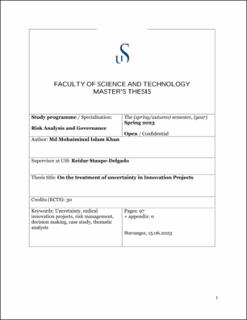| dc.description.abstract | The treatment of uncertainty in innovation projects is a critical aspect that must be addressed to improve project outcomes. This thesis focuses on identifying, measuring, and managing uncertainty in innovation projects, specifically emphasizing perspectives from innovation, risk management, and decision-making. The problematic aspects identified in the literature review include long incubation periods, standardized rules and procedures, non-existent market and market unfamiliarity, fuzziness in the fuzzy front end, team-based dynamic shifting capability, and selecting the right project leader.
The research gap identified in the existing literature is the absence of a unified framework or toolbox that comprehensively addresses uncertainty in innovation projects. This thesis aims to fill this gap by proposing a unified toolbox to treat uncertainty effectively. The analytical direction of the research involves identifying the areas of uncertainty, measuring the impact on project outcomes, and developing a toolbox to manage and mitigate those.
The research methodology adopted for this study is a qualitative case study approach, utilizing a multiple case study design. Two European Union projects – RESPONDRONE and ASSISTANCE, are selected for conducting a case study analysis. Thematic analysis is employed to derive meaningful insights and patterns from the data gathered during research.
From the thematic analysis of the selected cases, five key themes are identified that significantly impact the uncertainty treatment of radical innovation projects. The key themes are- technology and innovation, communication and collaboration, adaptive project management, stakeholder engagement, and risk management. Each theme significantly impacts uncertainty treatment in the four critical areas of uncertainty- market, technological, organizational, and resource. These observations steer the study to see the treatment of uncertainty in innovation projects through the lens of existing literature. An impact assessment flowchart is developed, and a unified toolbox is proposed for better uncertainty treatment by putting things into different perspectives.
This thesis concludes that the uncertainty paradigm in radical innovation projects is complex and nuanced. Rather than trying to pinpoint every aspect of it, a better approach for a project team is to understand the common areas of uncertainty generation, measure the impact of an unexpected event as soon as possible and equip themselves with a unified toolbox that can provide them the flexibility to use any tools necessary based on the context of the uncertainty. | |
